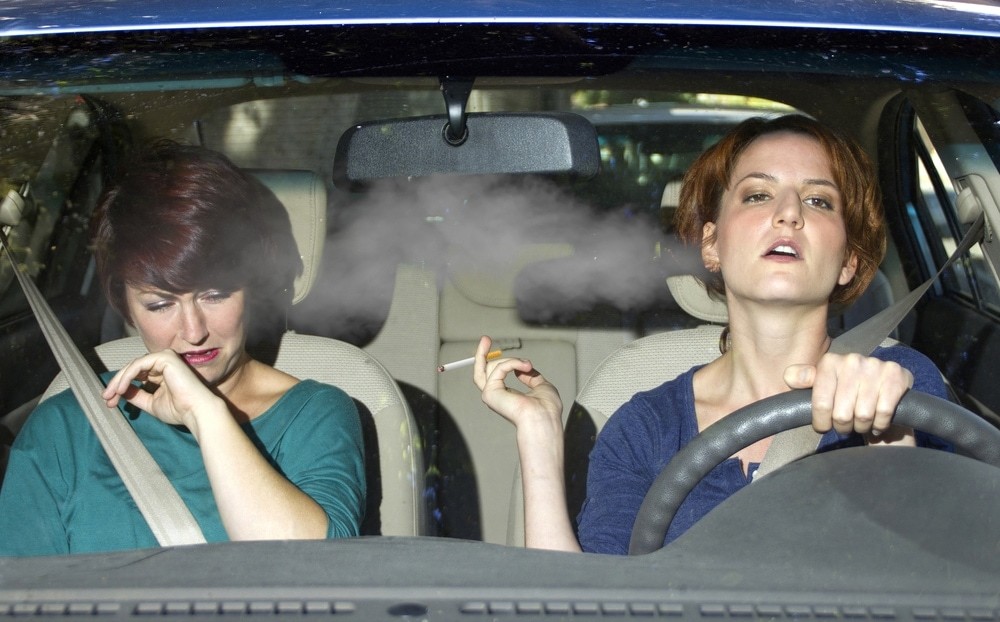All women are advised to quit smoking when they become pregnant; however, research has shown simply quitting is not enough to eliminate the risks associated with exposure to cigarettes. Many women are exposed to second-hand smoke from friends and family members or the residue cigarettes leave behind. Second-hand smoking during pregnancy can have detrimental effects on the health of you and your baby.
Second-Hand Smoke and Pregnancy
Second-hand smoke is characterized as the product released into the environment whenever someone who is smoking exhales. It can also come from the end of tobacco-containing smoking products. There are approximately 4,000 chemicals present in second-hand smoke, many of which have been determined to be related to cancer. If you are exposed to second-hand smoke during pregnancy, both you and your baby are put at risk.
Some of the health conditions associated with being exposed to second-hand smoke are a miscarriage, low birth weight, early birth, learning or behavioral deficiencies in your child, and Sudden Infant Death Syndrome (SIDS). SIDS is a disorder where an infant dies unexpectedly while they are sleeping. This condition is somewhat of a mystery as autopsies and medical examinations do not pinpoint a cause of death, and infants seem healthy before they die.
In order to reduce the risks associated with cigarettes and cigars, it is best to avoid smoke and smoking entirely.
Third-Hand Smoke and Pregnancy
Pregnant women can be exposed to this type of smoke without even realizing it. Third-hand smoke is the residue left behind by cigarettes on furniture, in rugs, in paint, etc. Third-hand smoke can stick around for months or years. If a place smells like smoke, even if no one is currently smoking, it is a safe bet there is tobacco residue there.
Toxins can enter your bloodstream when you either touch something containing the residue or breathe in some of the residues. When the toxins make their way into your blood, they are then shared with your baby. One study performed at the Los Angeles Research Institute determined that third-hand smoke residue has a detrimental effect on prenatal lung development. This can cause respiratory problems later in life.
If you and your partner are trying to get pregnant, are pregnant, or have recently had a child, it is best to minimize the amount of third-hand smoke in your home. You should stop smoking entirely if you are trying to conceive.
Make sure your partner smokes outdoors and does not enter the house wearing the outer clothing they have smoked in. For example, encourage your partner to wear a coat or sweatshirt when smoking and remove it before coming indoors. In addition, after being exposed to cigarettes, it is important you and your partner washes your hands before touching your baby.
What About Once Your Baby is Born?
It is important your baby has limited exposure to second-hand smoke even once he/she is born. Babies in contact with second-hand smoke are more likely to develop SIDS. In addition, children exposed to second-hand smoke experience negative effects on their immune system.
They are more likely to have ear infections, colds, respiratory ailments, and teeth problems. Third-hand smoke is likely to be as harmful as second-hand smoke to your infant, so it is important to keep your child away from areas that contain third-hand smoke residue.
Compiled using information from the following sources:
1. The Dangers of Secondhand Smoke.
2. Peterson, Tara & Mittal, Manoj K. (2011). Apparently Life-Threatening Event and Sudden Infant Death Syndrome in Florin, Todd A. & Ludwig, Stephen (Eds.), Aronson, Paul L. & Werner, Heidi C. (Assoc. Eds.), Netter’s Pediatrics (69). Philadelphia, PA: Elsevier Saunders.
3. Los Angeles Biomedical Research Institute at Harbor-UCLA Medical Center (LA BioMed). (2011, April 19). ‘Thirdhand smoke’ poses danger to unborn babies’ lungs, study finds. ScienceDaily.
https://www.sciencedaily.com/releases/2011/04/110419101231.htm
4. Mitchell, Teresa J. (2011, Nov. 1). Third-Hand Smoke Affects Your Baby.
(2011, May). Smoking During Pregnancy. Retrieved from: https://americanpregnancy.org/pregnancy-health/smoking-during-pregnancy/






